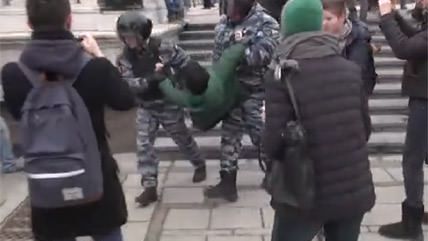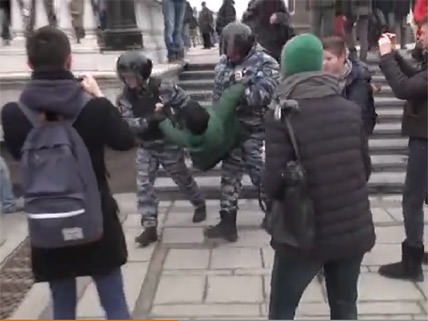Russia's Propaganda and Censorship War in Crimea and at Home


While the Russian military violates the sovereignty of Ukraine and threatens war by sending in soldiers, occupying the neighboring nation's airspace, and surrounding the Crimean peninsula with warships, the government has been conducting a parallel propaganda war.
The Daily Beast highlights a few of the false claims by state-run news outlets: video presented as "'skirmishes' on the streets of Crimea" turned out to be footage of government snipers slaughtering opposition protesters the week before; pictures purportedly of Ukrainians defecting en masse to Russia were actually from the Polish-Ukrainian border (and live feeds of the Russian-Ukrainian border seem to confirm this); another video said to be right-wing militants from western Ukraine was completely staged.
It's not just internal propaganda. The government-funded RT produced a cartoonish video pushing Kremlin rhetoric that the hundreds of thousands of diverse, multi-partisan Ukrainian opposition–which protested nonviolently for months until their authoritarian leader approved the use of live ammunition against civilians–are overwhelmingly fascists. "Fascist" is a go-to accusation Russian politicians and media use when silencing both foreigners and but domestic, pro-democracy critics.
The government has also censored pro-Ukrainian social media in Russia, while the military makes conspicuous calls for veterans to band together as "tourist units" and vacation in Crimea.
All of this works, except when it doesn't.
Many Russian citizens and ethnic Russian in Crimea are adamant about developing closer ties between the two and blame the west for destabilizing Ukraine, but according to Radio Free Europe, "independent opinions polls conducted before the crisis show that an overwhelming majority of Russians opposed Russian meddling in Ukrainian politics as well as a possible military intervention in the country."
Some have become vocal and active opponents of the invasion, since Ukraine has not provoked violence. The independent Moscow Times critiques that Russia was hoping to provoke a "'Georgian scenario' in Crimea. In that conflict, Russia invaded Georgia in 2008 because that country's troops attacked Russian servicemen, providing the perfect casus belli. But no such attacks took place in Crimea."
Yesterday, nonviolent anti-war protests took place in Moscow and St. Petersburg. Around 350 people were arrested in Moscow, according to The New Republic. Another Ukrainian-sympathetic rally with as many as 1,500 participants similarly shut down last week. Meanwhile, a larger pro-war demonstration went undisturbed.
Even the Consul General of Russia in the Crimea admitted that claims that Russian citizens were killed by Ukrainians–one of the pretexts for the invasion–was unfounded.
Radio Free Europe points out that the "a number of Russian luminaries, including rock musician Yury Shevchuk, have also delivered unusually harsh criticism of the Kremlin," and suggests that " rift in public opinion between educated, city-dwelling Russians and those living in small towns with only limited access online news sites."
Read more Reason coverage of Ukraine here.



Show Comments (88)